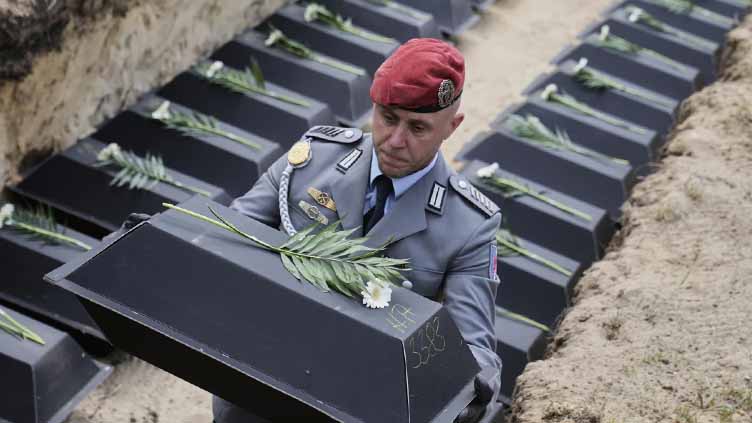80 years after World War II, Germany is still painstakingly searching for its fallen soldiers

World
It’s still not the end — much work remains to identify the dead and notify any surviving members
HALBE, Germany (AP) — In a forest near Berlin, the remains of 107 fallen Wehrmacht soldiers were ceremoniously interred last week. High school students placed white gerbera daisies on small black coffins, and German soldiers lowered them respectfully into a large, freshly dug grave as a military band played a solemn tune.
Hundreds of villagers and relatives of the fallen watched silently, some wiping tears off their cheeks, as the soldiers who died in one of the last large World War II battles fighting for Adolf Hitler’s army got their final resting place.
The gestures of remembrance are part of a long, complicated — and sometimes controversial — effort to bring the German dead to rest, 80 years after a war that Nazi Germany started.
It’s still not the end — much work remains to identify the dead and notify any surviving family members.
Across Europe, in forests, fields and beneath old farmland, the remains of German soldiers are still being found, exhumed and reburied by teams from a nonprofit organization called the Volksbund Deutsche Kriegsgräberfürsorge, or German War Graves Commission, which has been doing this work for decades.
A search for the dead
As the world pauses this week to mark the 80th anniversary of the war’s end, the continued search for soldiers’ remains is a reminder that the conflict’s legacy is not only historical or political, but also physical and unfinished, still unfolding across Europe.
“It’s very, very important that this is still being done,” said Martina Seiger, 57, whose grandfather’s bones were found and buried a few years ago.
Seiger and her family make a point of attending the burials of other soldiers who died in the battle of Halbe in 1945. It’s as close as they can get to some kind of funeral for her grandfather, Werner Novak.
Novak was 21 when he was killed. He had already been injured and sent back from the front to Berlin. He was planning to marry his pregnant fiancée and hoped for a more peaceful future, Seiger said.
Instead, as the Soviet’s Red Army was approaching Berlin in the last weeks of war, he was back into battle.
Lost in the chaos of war
The process of finding and identifying the remains is slow — many of the missing were buried hastily during retreat or combat, with no markers or records. Some sites are remembered only vaguely, passed down through local knowledge.
Others are beyond reach, beneath modern infrastructure or the front line in eastern Ukraine.
Still, the Volksbund works on, searching across Europe’s old battlefields, following tips, checking old military maps and missing soldiers lists. The work continues even in western Ukraine, away from the raging fighting in the country’s east.
When possible, the organization brings the remains to cemeteries maintained specifically for German soldiers who died abroad. It says its goal is humanistic: to offer a dignified burial to every person who died in the war, regardless of the role they played. That includes soldiers who served in a military responsible for some of the worst atrocities of the 20th century.
The Volksbund does not frame its mission as one of honoring the fallen, but of identifying them and ensuring they are not left to vanish into the earth, without a name.


